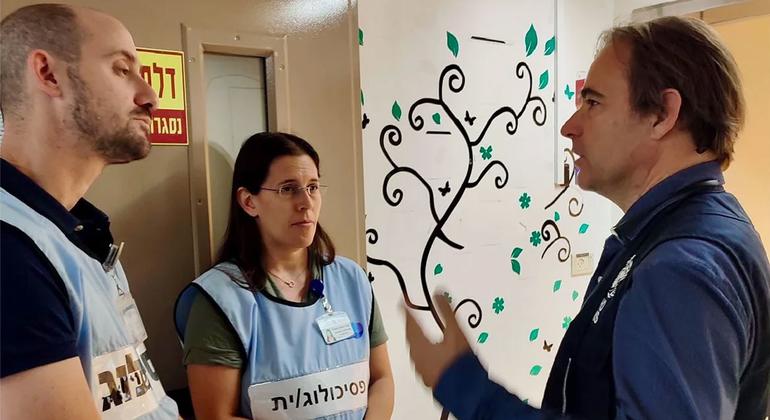WHO highlights mental health crisis facing Israeli frontline workers one year after October 7 attack
Responders including ambulance drivers, health workers and forensic teams who identified many of the dead, all witnessed “carnage and terror” that resulted in permanent trauma.
An organization called Mashiv Ha’Ruach, which means “Restoring the soul”, has provided mental health and mental health support through training courses supported by WHO/Europe. These meetings allowed workers to discuss their plight and develop coping strategies.
The founder of the organization, Eyal Kravitz, said that he created the group days after the attacks while wondering, who will help the helpers?
Meetings
Many of the recovery volunteers who offered their help after the attack suffered from insomnia, post-traumatic stress disorder. disorder (PTSD)) and high stress and anxiety that caused “a negative effect that affected their families and work.”
Mashiv Ha’Ruach’s workshops were part of a retreat and were held in the desert, away from “the noise and distraction of everyday life” and he encouraged participants to share what they saw.
Daniel Chermon, co-founder of Mashiv Ha’Ruach said: “In the beginning, no one thought they needed to talk about their experiences.
So, at first it was difficult for us to convince them to come, but once they arrived, people started hearing from their colleagues about the importance of going back.
Oz Tal, the first protester on October 7, said the workshop gave him “a language to express and express his feelings.”
First of all, most of the volunteers, when I tell them to come to the resort, they tell me that they are fine. They don’t need anything. They don’t want to come,” Mr. Tal said.
He continued, “But during the break, after we start talking about our feelings, the first one starts talking and starts sharing their problems, then the whole group starts. You can’t think about the atmosphere in the room at that time. ”
Working with volunteers
Atzmon Meshulam introduced the training program and said that the training helps the participants to change the way they talk about what they have seen. He noticed that many volunteers seemed calmer after the sessions.
“I received a message from the wife of a volunteer who attended the training. “She wrote to me that she had found a new husband, that it was the first time she had slept at night since October 7,” Ms Meshulam recalled.
Hodaya Leshem, one of those who came to the training who is a mother of four and married to a soldier said, “I had no support before I came to the meetings.”
“I had to unite everyone in the family and in the community, but no one could handle me,” he continued.
Mashiv Ha’Ruach has now extended its training to colleagues, staff and volunteers “to build a wider network of skills for stability and support.”
Evidence
Soroka Medical Center, a hospital 25 kilometers from Gaza, treated 680 patients – 120 of whom were seriously injured – within 16 hours after the October 7 attack .
WHO said many workers have lost close relatives or live in affected areas.
Dr. Dan Schwarzfuchs, Director of the Emergency Department at Soroka Medical Center said the workers would not have survived the job if they did not have power.
He says: “I knew that in my stomach I had to find something that would help them stay strong.
He said that the treatment given through the trainings helped to create bonds between the medical center’s staff.
Dr. Schwarzfuchs said: “Colleagues who previously did not want to talk about their experiences are opening up because they are hearing experiences from others. People I never expected to be there are doing so now.
The retreat was beneficial to Ayelet Harris, Head of the Community Department of the Kibbutz Association, who said the meetings provided a space for respondents to express themselves for the first time.
“When I went back, I felt that this was the first time I felt empowered again, because I was focused on me and my needs,” Mrs. Harris said. “It was a safe place for me to explain what I was going through, and someone was there to listen to me… It was refreshing and rejuvenating.”
Providing support
Since the beginning of 2024, Mashiv Ha’Ruach has helped nearly 1,000 people with their training retreats.
We did not start Mashiv Ha’Ruach under good circumstances. But the truth is that people need it and will need it for years to come,” co-founder Chermon said.
Founder Kravitz says their partnership with the health organization has allowed for broader access to individuals.
“We are proud to be the only resilience initiative in Israel that has received WHO attention, thanks to the recommendation of the Israeli Ministry of Health,” he said. This collaboration has been invaluable, and I want to express our deep appreciation for WHO.
In addition to supporting Mashiv Ha’Ruach, WHO also assisted the Israeli NGO Mosaica with a project that included
religious leaders from the Jewish and Muslim communities, connecting people with mental health resources, increasing acceptance and lowering the stigma of seeking treatment.
#highlights #mental #health #crisis #facing #Israeli #frontline #workers #year #October #attack
